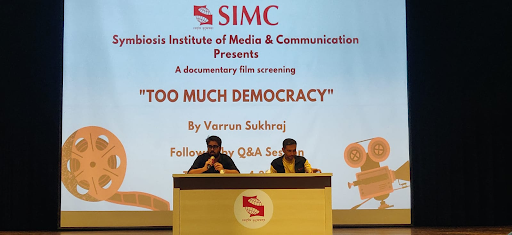Bansri Shah and Shreya Varanasi, Pune
The hallway outside the auditorium was abuzz as the viewers delved into in-depth discussions about the documentary Too Much Democracy, even after an hour-long question-and-answer session with the filmmaker, Varrun Sukhraj, himself. Everyone had an opinion, and no one was ashamed to hold it back.
The documentary followed the Farmers’ Protests of 2020, going behind the scenes and showing the plight of the farmers for those eleven long months. With a mix of interviews, music, parallels, and, most importantly, an element of sentimentality, it was an insightful ninety minutes. And when it ended, there were a multitude of reactions – the good, the bad, and everything in-between.
Anusha Ananth Kumar, a second-year AV student at Symbiosis Institute of Media and Communication (SIMC), talked about her experience after watching the film. Hailing from Chennai, her main source of news was the mainstream media, which had been evidently biased in depicting the protests. She looked at the documentary as filling the gap of sentimentality that was lacking in the reporting done at the time. She wanted the raw emotion to be captured, and the film did just that.
However, not everyone had the same opinion. While they appreciated the emotional impact it created, they did not agree with the subjectivity interspersed within it. Many felt that several opinions, like those of police officers, as well as incidents, were excluded from the narrative. According to them, the film was successful in context with the filmmaker’s vision but not as a documentary.
Khushi Bhuta, a first-year Journalism student, expressed her opinion about the film’s bias, saying, “It’s okay to write pieces that are heavily opinionated as long as you are making it clear that it is opinionated… which in this case, I did not get by just looking at the documentary. If it is taken out of context as an opinion piece, it can be seen as something that is extremely biased.” On the other hand, talking about the same, Anusha said, “Each one of those truths will be extremely biased, and it is important for us to see each and every one of those truths, and this was one of them that I personally agree with and like.”
“What this documentary does is bring a lot of cohesive structure and also a lot of cohesion to our thought process,” said Dr. Ruchi Kher Jaggi, the director of SIMC, who also attended the screening. In terms of historicity, she was glad that the documentary provided visual evidence of the protests and the predicament of the farmers. Adding on to this, she said, “I was glad to see so many people applauding and cheering, which also means we have hope in the future of this country… Because of you guys, one hopes there will be a change. It makes me feel more optimistic.”
